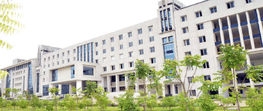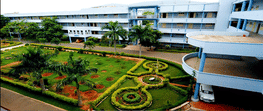Prof. Radhika Y is the Director of Academic Affairs at GITAM (Deemed to be) University. She has acquired her Ph.D. and completed her M.Tech. from College of Engineering, Andhra University. Besides serving as a teaching faculty, Prof. Radhika is actively involved in research activities and published in various National and International journals.

How do academic affairs give support to the students in terms of improving their experience?
There have been so many changes in the education system in the recent past with regard to implementing NEP 2020. Not all institutes have implemented this, but we are way ahead of them and have started implementing NEP in the 2023–24 Academic Year for UG programmes in three schools: business school, humanities, and sciences. We are providing a complete interdisciplinary experience for the students, with a plethora of course choices, in line with the UGC guidelines including flexibility and diversity of modules.
Where we are adopting a new thing, the transition takes time. How do you provide guidance to challenges that the students face?
Transition at such a scale, merits the necessary infrastructure to back-up the process of change. We have been preparing for this transition and to adopt the NEP framework from a year ahead - right from the curriculum design to collaborating with domain-specific experts to ensure a smooth transition. We have come up with a solid curriculum, particularly in these three schools. In the final year of this four-year undergraduate programme, there are two variants: either the student can go for the Honours Programme or for a research component. We are conducting faculty development programmes where we need to have additional support when it comes to advanced courses. Speaking of research, we have spent a significant amount of money in acquiring state-of-the-art equipment. This will ensure a conducive platform for students to take up research.
What are the challenges with ever-changing curriculum structures that are happening? What do you feel are the current major challenges in the education sector in general?
Being attuned to the latest trends and keeping ourselves well-informed is of utmost significance within an education system. To guarantee this, we've established a comprehensive faculty development program aimed at upskilling our educators. As for the students, we don't adhere rigidly to a fixed set of courses for an extended period. Instead, we regularly update our curriculum to meet the demands of the industry. This process involves incorporating a range of courses focused on the most recent technologies, programming advancements, and technological breakthroughs.
What is the main emphasis that you're currently focusing on with respect to the curriculum and academics of GITAM University?
Regarding the curriculum, we have successfully transitioned to NEP 2020 for three schools; our preparations are complete in that regard. Additionally, a key focus is on ensuring our students are well-prepared for the industry. Given that this is the inaugural year of implementing the new curriculum, we are positive that the changes we have made will prove advantageous to our students, aligning perfectly with industry requirements.
How do you promote and what kind of initiatives are implemented to give more practical exposure to the student?
Many of our courses feature a practical component that introduces students to application of the concept. Courses are designed with an integration of theory and practical aspects, helping students with the hands-on application of the course material.
How do you make sure that the same kind of support and resources are provided to all the schools equally, among the 12 schools in GITAM?
GITAM is actively investing in curriculum development, particularly focusing on enhancing the research component and content across all programs.
I'd also like to emphasize that our commitment to student development goes beyond just the curriculum. We have designed a set of unique courses that contribute to the holistic growth of our students. For instance, programming has been made a mandatory subject for all students, regardless of their domain. This ensures that students gain a fundamental understanding of programming, complementing their general courses. Additionally, we offer value-added courses like “Gandhian thought for the 21st century”, which every GITAM student must undergo.
At GITAM, we strongly believe in providing students with ample opportunities to explore various domains beyond their academic pursuits. We encourage them to participate in sports, cultural activities, and various forms of dance such as Bharatanatyam and Kuchipudi, as well as diverse forms of music. Students can freely choose to pursue courses in any of these domains and even complete a minor in their area of interest. This approach encourages students to develop a well-rounded and versatile skill set.
There are multiple clubs in the college, how do the academic affairs collaborate with them in terms of implementing any initiatives?
Programme structures are designed in such a way that the students will be able to earn credits for their participation in club activities. A separate unit oversees the clubs. Students can register and participate to earn extra credits based on their roles.


.png?h=132&w=263&mode=stretch)
 (1).png?h=132&w=263&mode=stretch)




.png?h=78&w=78&mode=stretch)






























.png?h=72&w=72&mode=stretch)



 (1).png?h=72&w=72&mode=stretch)



.jpeg?h=72&w=72&mode=stretch)
.png?h=72&w=72&mode=stretch)
.png?h=72&w=72&mode=stretch)
.png?h=72&w=72&mode=stretch)






![Aditya Engineering College - [AEC]](https://image-static.collegedunia.com/public/college_data/images/logos/1591109396Annotation20200602201850.jpg?h=72&w=72&mode=stretch)








.png?h=72&w=72&mode=stretch)




Comments